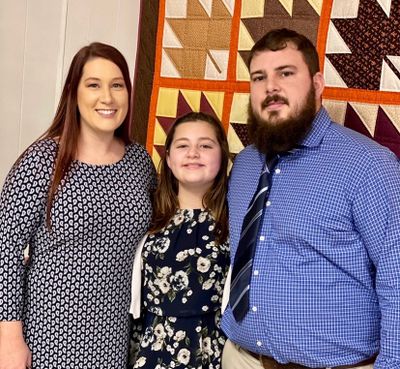As Justin Earle prepares to graduate from West Virginia University with his master’s
degree in forest hydrology, he reflects on the challenges and opportunities of
his educational experience.

A non-traditional student, Earle served three years in the United States Army before
enrolling at
Potomac State College in 2012.
“I was older and more responsible when starting this journey,” he said. “Because
of this, I feel that I took college more seriously than some traditional students
sometimes do. Being older and having some life experience gave me the opportunity
to really think about what I wanted to do with the rest of my life.”
Faced with adjusting to life outside the military and becoming a college student,
he played an integral role in creating a student veteran organization on WVU’s
Keyser Campus.
“Working with the college and Representative David B. McKinley, we were able to create
the organization, establish parking spaces for veterans on campus and designate
a student veteran room,” Earle said. “Being involved in the creation of Potomac
State’s student veteran organization is one of the greatest highlights from my
time at Potomac State. It was an honor to help build an organization that will
ease the transition of future student veterans from military life to academia.”
With the support he found at home and on campus, Earle graduated in 2015 with dual
associate degrees in wildlife and fisheries resources and recreation, parks and
tourism resources.
Relocating to Morgantown with his wife and daughter to pursue his bachelor’s degree
in
wildlife and fisheries resources, Earle discovered life at WVU was different.
“It was challenging at times to balance my responsibilities to my family with my
responsibilities to my education,” he said. “For example, I had to be sure that
if I had an 8:00 AM class that my wife could get our daughter to school or that
we had other arrangements made. I think that is definitely a challenge most WVU
students don’t face.”
It was also more difficult to connect with peers, but he worked to overcome that.
In fact, he offers this piece of advice to future Mountaineers:
“Cherish the friendships and memories that you will gain from your time at WVU.”
The student veteran didn’t expect to be profoundly impacted by the people he encountered.
“I was shocked to find that some of my classmates soon became family,” Earle said.
“I’ve gained lifelong friendships and made memories that will last a lifetime.
I will always be thankful for this.”
Why did you choose your major or degree program?
While working on my bachelor’s degree in wildlife and fisheries resources I found
myself becoming more interested in West Virginia’s water. Afterall, it is critical
to the survival of West Virginia’s wildlife and fish species. I learned about the
Forest Hydrology degree from a TA of mine who introduced me to the professor who
is now my advisor. After talking with him and learning more about the work that
he and other hydrologists have done I knew that expanding my knowledge of West
Virginia’s water was the next step to take.
What has been your most meaningful experience at WVU?
I don’t have one particular experience during my time at WVU that means the most
to me rather a collection. My most meaningful experiences at WVU include those experienced
with friends. Tailgates in the blue lot, Mountaineer football games, late night study
sessions, and celebratory drinks to mark the successes of one another. These are
the experiences that means the most to me from my time at WVU.
If you could trade places with one person for a day, who would it be and why?
If I could trade places with one person for a day, I would trade places with coach
Neal Brown. I love football, especially our WVU Mountaineers. I would love to experience
what it like to coach at the collegiate level and who better to coach than our
boys in blue and gold?
What is one thing you would have done differently during college?
One thing that I would have like to have done differently during college would have
been to study abroad. Being a non-traditional study with a family this is a bit more
challenging to accomplish but looking back it is something I would have liked to
experience.
Describe any internships, research or study abroad opportunities you participated in. How did they benefit you?
As a graduate student I had the opportunity to work with the Mountain Hydrology Lab. My work with this lab included conducting research and analyzing data to create maps and projects that illustrate the water stress index of West Virginia’s Hydrologic Unit Code (HUC) for HUC 8 and 12. This opportunity allowed me to use GIS to illustrate water use and stress in WV’s HUCs. It helped me gain an understanding of water stress and why it is important to understand how much water our state has and how to manage our water use. It also helped me to understand the impact climate change has on West Virginia’s water and how this may impact the future of West Virginia’s water availability and usage.
Your final semester of college obviously didn’t go as planned. How did you stay
focused? What lessons did you learn?
My educational journey has been a long one. First beginning back in 2012, it has
been a long road to get to graduation for my master’s degree. Although the challenges
and distractions that the Coronavirus pandemic presented were great, the determination
I had to complete this journey was greater. It was this determination that kept
me focused. I learned that people will rise to meet the challenges they face, there
is good in most people, and that toilet paper is the currency of the future.
Photo Caption: Justin Earle (right) with his wife Kaitlin (left) and daughter McKenna.